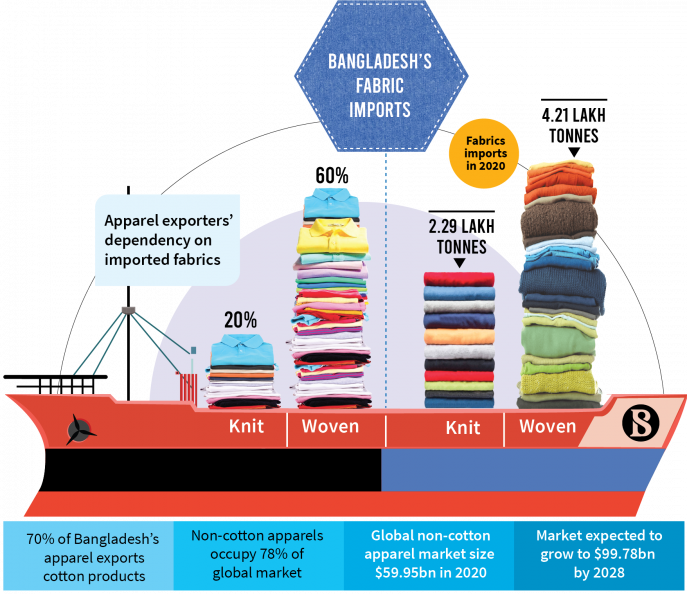Non-cotton fabric begs for more investment
Since Bangladesh is still focused on cotton fabrics, woven apparel makers need to depend on imports to meet around 60% demand for non-cotton fabrics

Bangladesh's textile makers feel the urgency to increase local capacity in man-made fibre to cope with the fast-changing global fashion with consumers switching from cotton to blended fabrics.
Since Bangladesh is still focused on cotton fabrics, woven apparel makers need to depend on imports to meet around 60% demand for non-cotton fabrics.
Leading spinners, who are planning to invest in non-cotton fibre, want the government to extend policy support for capital-intensive synthetic fabric units to help woven exporters diversify their products and stay competitive.
For now, joint-ventures between local and technologically advanced foreign companies can be a solution, they also say, adding that thus, there will also be opportunities for local research to develop high-value yarns.
Spinners say their supplies of woven and manmade fabrics to apparel manufacturers are still very low when compared to demands as setting up facilities for manufacturing such fabrics needs a big investment that they cannot go for in the absence of necessary policy support on the government's part.
According to Bangladesh Textile Mills Association (BTMA), local spinning millers meet 80% of the demand for export-oriented knitted fabrics, while they account for only 40% of woven fabric supplies.
Apparel entrepreneurs imported nearly Tk2.30 lakh tonnes of knitted fabrics and over 4.21 tonnes of woven fabrics in 2020.
Mohammad Ali Khokon, president of BTMA, said, "The manufacture of woven fabrics is very complicated as it goes through 8 to 10 steps. It costs at least Tk300 crore to set up a medium-sized woven textile mill."
Pressing for uninterrupted and quality gas and electricity supplies to textile mills, he said the government should offer an incentive to encourage investments in this sector.
The BTMA president also said local textile millers also supply about $8 billion worth of fabrics for the local market.
BGMEA Vice-President Shahidullah Azim said there is no alternative to joint-venture investments to develop a strong backward industry for non-cotton fabrics.
"Joint venture is very important to begin a new factory and it also offers us a scope to learn about new technology. At the end of the day, factories will be ours."
Earlier, China, Hong Kong and Vietnamese people would come to Bangladesh to train people here who eventually replaced them after a certain time, he said.
"Bangladesh has to import activewear and woven fabrics from China, the largest supplier to the global market. Cotton fabrics are also available in China at the cheapest rate, but we always try to use local fabrics as it has a lot of advantages such as a short lead time," he added.
Fazlee Shamim Ehsan, chief operating officer at Fatullah Apparels, said the government has to provide both backward and forward industries with attractive policy support to draw in new investments, said
"On some occasions, we need to import fabrics as per buyers' nominations despite having available stocks in the local market. Because when buyers place big orders for similar products to more than one country, they prefer raw materials from a single source to maintain quality."
In response to the increasing use of blended yarns globally, many spinners have of late come up with more investments in producing such yarns that include cotton, polyester, nylon, wool and viscose etc.
Some are converting a part of their capacities to manufacture synthetic yarns and some others are investing to set up new units for synthetic and blended yarns.
BTMA Director Engr Razeeb Haider Munna said all those initiatives depend on market demand and spinners are taking such a decision in response to garment owners' queries for synthetic and blended yarns.
He hoped that the production capacity of such yarns will be higher within a year.
Man-made fibre apparels have occupied about 78% of the global clothing fashion market, where the remaining stake goes to cotton made clothing items. However, Bangladesh's apparel exports constitute about 70% of cotton apparel and the rest are made of synthetic fibre, according to the International Textile Manufacturer Federation.
Bangladesh has an opportunity to invest in the woven sector, especially in synthetic yarns, said Mohammad Enamul Karim, executive director (spinning) at Noman Group, one of the largest spinning and textile manufacturers in South Asia.
China, India, Vietnam and Pakistan have long been maintaining upper positions in the production of woven and non-cotton and synthetic yarns as they have everything available locally - from machinery, fibres, dyes and chemicals – giving them an edge over Bangladesh.
Bangladesh has only two things at competitive costs - manpower and power.
"We are lagging behind in manmade fibre-based fabrics as it needs larger investment than other textile industries," said Faruque Hassan, president of the BGMEA.
Faruque said, "Bangladesh exports about 70% of cotton-based garments, thanks to the local primary textile industry, but we should now focus on investing in non-cotton fabrics, which will contribute to diversifying the apparel basket as well as will make it more competitive in the global market."
Mentioning that the government offers a tax break on investment, he said if the government incentivises non-cotton apparel exporters, its market share will be higher within a year.
The BGMEA president thinks if the government provides a 10% cash incentive on new non-cotton products, it will help them export an additional $2 billion in apparel a year.
He also said apparel exporters have explored about $7 billion new markets, thanks to the government's cash incentives.
Envoy Textile Ltd Chairman Kutubuddin Ahmed said, "We are increasing spinning capacity to produce cotton and synthetic blended 'expanded yarn' as a substitute for imported yarns."
According to the Export Promotion Bureau (EPB), in FY21, Bangladesh exported $32.59 billion worth of apparel products and home textile items, which was 84% of the total export.



 Keep updated, follow The Business Standard's Google news channel
Keep updated, follow The Business Standard's Google news channel
















